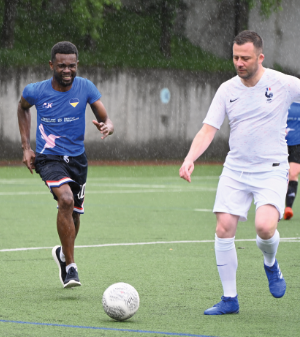Football – More Than a Game for displaced and stateless people
 UNHCR, the UN Refugee Agency, is dedicated to saving lives, protecting rights and building better futures for refugees, displaced and stateless people. According to UNHCR data, by mid-2022 103 million people globally had been forced to flee conflict, violence and persecution, more than 40% of whom were children under 18 years. In Europe today more than 8 million Ukrainian refugees have fled across the continent and an estimated 17.6 million remain in need of urgent humanitarian assistance inside Ukraine. Statelessness, which in most cases means you cannot travel, open a bank account, go to school or access health care, continues to affect some 480,000 people in Europe alone. By Stephen Reynard, UNHCR, Sport Coordination Officer.
UNHCR, the UN Refugee Agency, is dedicated to saving lives, protecting rights and building better futures for refugees, displaced and stateless people. According to UNHCR data, by mid-2022 103 million people globally had been forced to flee conflict, violence and persecution, more than 40% of whom were children under 18 years. In Europe today more than 8 million Ukrainian refugees have fled across the continent and an estimated 17.6 million remain in need of urgent humanitarian assistance inside Ukraine. Statelessness, which in most cases means you cannot travel, open a bank account, go to school or access health care, continues to affect some 480,000 people in Europe alone. By Stephen Reynard, UNHCR, Sport Coordination Officer.
Recognizing the scale of the challenge and potential of football – and sport more broadly – to improve the lives of displaced and stateless people, in November 2022 UNHCR launched “More than a Game”, the organization’s first global sport strategy. “More than a Game” describes UNHCR’s approach to working with and through the world of sport, provides examples of promising initiatives and articulates this around five pillars of action. The football ecosystem already contributes significantly to improving refugees’ lives, both in partnership with UNHCR such as with FC Barcelona and Nottingham Forest FC and individually. Below are 5 initiatives aligned with the pillars of UNHCR’s sport strategy that highlight in more detail this contribution.
Scoring for refugees
Sport and play based activities: Whether in refugee camps, settlements or urban areas, football for protection activities are contributing to improved Protection (social) outcomes for displaced and stateless people.
In Libya, UNHCR and partners have been using football to improve the psychosocial wellbeing of young people in the Tripoli municipality of Abu Salim. UNHCR Libya renovated the Abu Slim stadium creating a safe space for local partner the Libya Scouts to implement activities, supported remotely by international partner Fútbol Más, who developed a curriculum and shared capacity with the Tripoli based coaches and youth facilitators. To date, 550 vulnerable young people have participated in sessions and learned valuable life skills including conflict resolution, teamwork, self-regulation, communication and recognition and expression of emotions.
Support to elite talent: Providing support to young refugee footballers with elite potential is another way in which football is contributing to improving the lives of refugees. UNHCR collaborator, the Brazil-based professional football club Black Pearls has provided opportunities to Syrian refugees from Zaatari refugee camp joining the club to train as professionals. The Black Pearls Academy has also provided work opportunities to Ukrainian refugees who are professional football players. The Brazilian Football Confederation (CBF) also changed their internal rules so that athletes with a refugee status can play and work in Brazil. Such schemes can provide an important opportunity for refugees to leave a crowded camp and restart life elsewhere and is a powerful source of hope for thousands of young refugee footballers.
Communications and Advocacy: Football also provides an important platform to raise awareness of displacement issues, and work with clubs and associations to find opportunities for joint advocacy. UNHCR’s partnership with UEFA saw the first edition of the Unity Euro Cup held at UEFA headquarters in Switzerland in 2022. The Unity Euro Cup also created greater awareness about refugee issues within football associations across Europe. The second edition is set to take place in Frankfurt, Germany in June 2023.
 Football Diplomacy: International football stars, Alphonso Davies and Lucy Bronze, are playing a key role in using their popularity as a diplomatic tool to facilitate discussion and influence public opinion on refugee issues. Alphonso and Lucy are important advocates for the rights of displaced and stateless people and are engaging a wider audience in UNHCR’s work.
Football Diplomacy: International football stars, Alphonso Davies and Lucy Bronze, are playing a key role in using their popularity as a diplomatic tool to facilitate discussion and influence public opinion on refugee issues. Alphonso and Lucy are important advocates for the rights of displaced and stateless people and are engaging a wider audience in UNHCR’s work.
Mobilising resources: The world of football, including football federations, associations, clubs, brands, events and high-net-worth individuals, presents a unique opportunity for mobilizing resources in support of the people UNHCR serves. As part of the UNHCR and World Food Programme (WFP) initiated #football4ukraine campaign in support of the 2022 Ukraine response, Adidas auctioned the match ball from the 2022 Champions League final and donated the proceeds to UNHCR. The “peace ball” is just one out of many examples of how football can mobilize resources for people forced to flee.
Can Football do more?
These examples provide a blueprint for how football can become more than a game for displaced and stateless people. While there are several promising practices outlined, one wonders if the world of football, given its reach and depth, is doing enough to leverage its power for those in desperate need of humanitarian assistance? Put differently, what would a review of football’s support for the people UNHCR serves using video assistance referee (VAR) technology reveal?
Sport and Citizenship 56 : Conclusion of the Fire+ project







 INSCRIPTION
INSCRIPTION
 CONTACT
CONTACT FACEBOOK
FACEBOOK